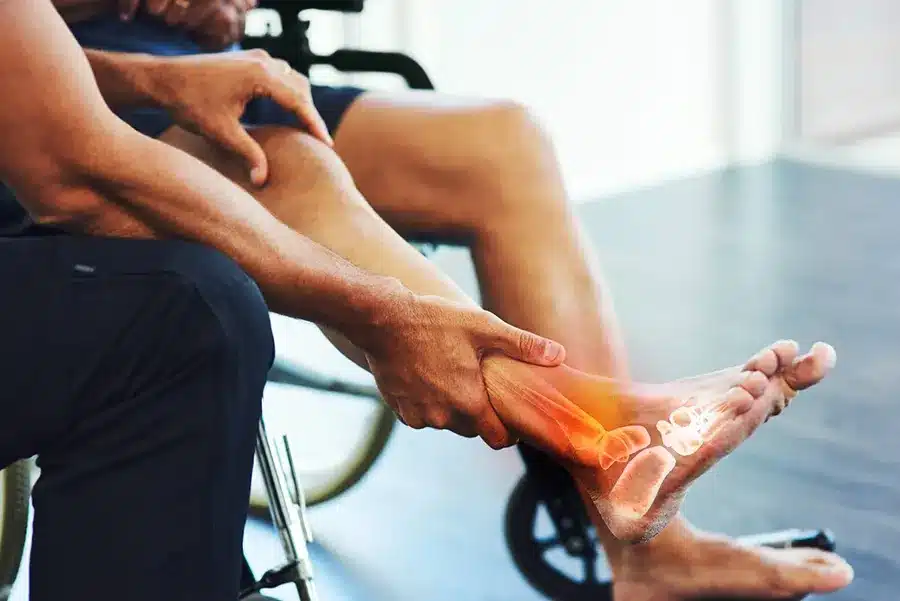Explore the essential steps to take after a workplace foot or ankle injury in Charlotte to get your rightful workers’ comp benefits
Being on your feet all day is a reality for many Charlotte workers. So what happens when a foot or ankle injury sidelines you, leaving you in pain and questioning how you’ll pay the bills?
The good news is that in North Carolina, most workers are entitled to workers’ compensation benefits after an injury, which provide financial relief and medical benefits during their recoveries.
Whether you’ve been injured working at a construction site, a grocery store, or a hospital, we’ll explore your rights, the benefits available, and the steps you need to take to ensure you get the support you deserve.
How many foot injuries occur in the workplace each year?
Foot and ankle injuries are relatively common for many workers in North Carolina and across the U.S.
According to the U.S. Bureau of Labor Statistics (BLS), workers in the private industry experienced approximately 99,520 nonfatal injuries involving a foot or ankle in 2020 that resulted in days of missed work. That’s about 8.4% of all work-related injuries and illnesses that year.
What are the most common foot and ankle injuries at work?
For many Charlotte workers, a typical day involves being on their feet for extended periods. Unfortunately, this constant pressure and movement can expose our feet and ankles to a variety of injuries.
Here’s a breakdown of some of the most common foot and ankle injuries for Charlotte workers:
- Sprains and strains. These are the most frequent work-related foot and ankle injuries. A sprain involves stretching or tearing ligaments, while a strain affects muscles or tendons. These injuries can occur from slip and fall accidents or other incidents that cause awkward twists, impacting workers in various fields like retail, construction, and hospitality.
- Fractures. Falls from heights, dropping objects on your foot, or repetitive stress can all lead to fractures in the bones of the foot or ankle. These fractures can be incredibly painful and require immobilization with casts or even surgery, significantly impacting workers who rely on mobility for their jobs, such as dock workers, nurses, and coal miners.
- Puncture wounds. Stepping on a nail, sharp object, or exposed staples can cause puncture wounds in the foot. While some may seem minor, they pose a risk of infection and should always be evaluated by a medical professional, most commonly impacting workers in fields like search and rescue, construction, and roofing.
- Plantar fasciitis. This is a common overuse injury affecting the plantar fascia, the tissue that supports the arch of the foot. Pain, inflammation, and tenderness are typical symptoms, especially for workers who spend long hours on their feet in jobs like cashiers, janitors, and assembly line workers.
- Tendonitis. Repetitive motions or awkward positions can irritate tendons in the foot and ankle, leading to pain, swelling, and difficulty walking. This can affect workers in professions requiring repetitive movements, such as teachers, truck drivers, and delivery drivers who are constantly on the road.
- Crush injuries. Heavy objects falling on the foot or getting caught in machinery can cause crush injuries, leading to severe damage to bones, muscles, and tissues. These are especially serious injuries that can require extensive medical care and rehabilitation, impacting workers in high-risk fields like oil and gas, construction, and manufacturing.
What happens if I sprain my ankle at work?
If you sprain your ankle at work or suffer any other kind of work-related injury, illness, or disease, you may be entitled to workers’ compensation benefits. These benefits are designed to cover medical expenses, lost wages, and rehabilitation costs related to work-related injuries.
In North Carolina, most workers are eligible for these benefits if they are employees of a business that has 3 or more employees. However, some workers, including independent contractors, don’t qualify for workers’ compensation.
For an injury or health condition to be eligible for workers’ compensation, it must be work-related, meaning it occurred during the course and scope of your employment activities. This includes injuries sustained while performing job duties, at the workplace, or at other locations if you were engaged in work-related tasks.
Top 10 Mistakes To Avoid After a Work Injury
in North Carolina
Avoid these common mistakes to increase your chance of a successful workers’ compensation claim.
How do I file a workers’ comp claim after an ankle or foot injury in NC?
After sustaining the injury, you must report the incident to your employer as soon as possible, but typically within 30 days, to be eligible for benefits. You should also seek immediate medical attention for your injury and make sure to inform the health care provider that it is work-related.
To initiate a workers’ compensation claim, you’ll need to complete the necessary paperwork, including Form 18, which should be filed with the North Carolina Industrial Commission (NCIC). This form serves as official notice of the accident and your intention to seek workers’ compensation benefits.
If your claim is denied or you face any challenges during the process, consider consulting with a workers’ compensation attorney to help navigate the process and ensure you receive the benefits you’re entitled to.
How much do you get for a foot injury at work?
In North Carolina, workers who injure a foot, ankle, or any other body part are entitled to various types of benefits under the workers’ compensation system. They include:
- Medical benefits. These cover all necessary medical treatments related to your foot injury, such as doctor visits, surgeries, medications, physical therapy, and any other necessary medical care. There are no caps or limits on these benefits, as long as they’re considered reasonable and necessary for your recovery.
- Wage replacement benefits. If your foot injury prevents you from working, you may receive disability benefits. These benefits are typically two-thirds of your average weekly wage and are subject to minimum and maximum limits set annually by the state. The duration and amount depend on whether your disability is classified as a temporary total, temporary partial, permanent partial, or permanent total disability.
- Scheduled loss of use. Under Section 97-31 of North Carolina’s Workers Compensation Act, workers may be entitled to specific scheduled loss of use awards for permanent injuries to certain body parts, including the foot, for a set number of weeks. For example, an amputation injury that results in the loss of a foot would entitle a worker to 144 weeks of compensation at two-thirds of their average weekly wage.
- Vocational rehabilitation. If you’re unable to return to your previous job due to your injury, you might be eligible for vocational rehabilitation services, which include job retraining, education, and other resources to help you return to work in a new capacity.
- Death benefits. If a worker dies from a work-related foot injury, their dependents may be eligible for death benefits, which typically include a portion of the deceased worker’s wages and coverage for funeral expenses.
The specific amount of compensation and the type of benefits available can vary based on the details of your case, including how the injury impacts your ability to work and your earnings prior to the injury.
Consulting with a workers’ compensation attorney can help ensure you receive all the benefits you’re entitled to, especially if your case involves complex issues or catastrophic injuries.
Does surgery increase a workers’ comp settlement in North Carolina?
Typically yes. Undergoing surgery can affect the amount of a workers’ compensation settlement, primarily because it indicates a more serious injury that may lead to higher medical costs, longer recovery periods, and potentially greater impacts on your ability to work.
While surgery itself does not guarantee a higher settlement, the factors associated with surgical treatment—such as increased medical expenses, extended time away from work, and long-term effects on your employment capacity—often contribute to a larger settlement amount.
Get help from an experienced North Carolina work injury attorney
If you’ve experienced a serious foot or ankle injury at work in Charlotte, NC, the knowledgeable attorneys at Wilder Pantazis Law Group are here to support you.
With more than 85 years of combined experience, our dedicated Charlotte work injury attorneys understand the complexities of workers’ compensation claims and are committed to advocating for your rights and entitlements.
We can guide you through every step of the process, ensuring that you understand your options, and we’ll work tirelessly to secure the maximum compensation you deserve.
Contact our office today to set up a free consultation, and let us take the burden off your shoulders so you can focus on what truly matters—your recovery and well-being.
References
97-31. Schedule of injuries; rate and period of compensation. (n.d.). www.ic.nc.gov. Retrieved March 21, 2024, from https://www.ic.nc.gov/ncic/pages/statute/97-31.htm
Table EH1. Number of nonfatal occupational injuries and illnesses involving days away from work by selected worker and case characteristics and medical treatment facility visits, all U.S., private industry, 2020. (n.d.). www.bls.gov. https://www.bls.gov/web/osh/cd_eh1.htm


